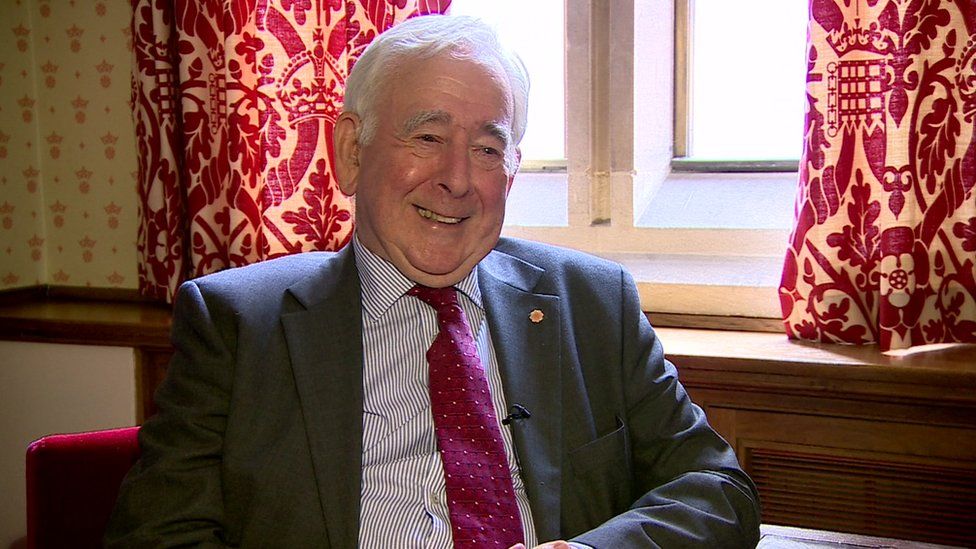Dafydd Wigley: Ex-Plaid leader to retire from House of Lords
- Published

After 50 years in politics, ex-Plaid Cymru leader Lord Dafydd Wigley is to retire from the House of Lords.
He will turn 80 next year and thinks that will be the time "to call an end to things".
Lord Wigley was first elected as a Plaid Cymru councillor in Merthyr Tydfil in 1972, before becoming the MP for Caernarfon between 1974 and 2001.
He was Caernarfon's Assembly Member from 1999 to 2003 and has been a member of the House of Lords since 2011.
"When I entered the House of Lords 10 years ago, members weren't allowed to retire, they left when they died. But of course there is now a right to retire," he told BBC Radio Cymru.
He believes 10 years as a peer is enough.
"When I came in, I thought 'if I get a decade here, if I can contribute for a decade maybe that will be enough'."
The former Plaid leader does not want to set a specific date for his retirement yet, but as the only member of his party in the House of Lords he wants "the party and Wales to decide what our attitude is towards sending members to the second chamber".
"Do we follow the same pattern as the SNP, that doesn't send members here?
"I personally think there is work to do here, but it isn't work that can be done if the party doesn't get the respect they deserve, and that means getting a proper team."
He is eager for Plaid's national council to decide, before he leaves, if they want other members to follow him to the Lords.
"In my opinion, if we have members here we should have the same number as in the House of Commons.
"And I would hope that they are elected by the party so there is a democratic basis to it.
"But in the fullness of time, if there is to be any future at all to the House of Lords, it has to be become an elected House, to give our voice some power."
Lord Wigley, who led the party from 1981-1984 and 1991-2000, is the only Plaid politician to enter the House of Lords with the blessing of his party as it opposed the nomination of members until 2007.
By that time the National Assembly had the power to create its own laws, but only with the consent of both Houses of Parliament.
According to Lord Wigley, "it was important that we had a voice here to argue our case".
Plaid Cymru was promised three seats by the Labour government of the time, and Lord Wigley, Eurfyl ap Gwilym and Janet Davies were chosen following a vote at the national council in January 2008.
Initial discussions happened while Tony Blair was prime minister, but by 2008 it was Gordon Brown in Number 10.
"According to what Labour members told me afterwards, Gordon Brown had said 'over my dead body does any nationalist go into that chamber'.
"So from 2007 to 2010 we were blocked, they refused to keep to their promise."
Lord Wigley finally became a peer in 2010, once David Cameron was the prime minister, but he was under the impression the two others would follow.
"We were betrayed again," he said, "this time by the Tories".
"Trying to run a one person party in a chamber of 700 members, when there's a big range of policies, many of them relevant to Wales, it's near impossible and the work load is substantial."
After taking a central role in Welsh politics for decades, it is unlikely he will put his feet up completely when he retires.
Even though he will be leaving politics, Lord Wigley said he hoped to contribute to Welsh public life for some time yet.
Liz Saville Roberts, Plaid Cymru's leader in the Commons, said Lord Wigley's "passion and integrity stood out at all times in his contributions in the Lords".
"There is no doubt that his announcement of retirement means that Wales' voice will be greatly diminished in Parliament," she added.
"On a personal level, I am profoundly grateful to Dafydd for his steadfast support, sound advice and good humour during our time working together in Westminster.
"But I am in no doubt that his contribution to politics is not yet complete."